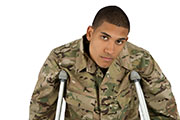
FRIDAY, April 4, 2014 (HealthDay News) — Although sexual harassment is damaging for both men and women in the military, new research finds that military men have more trouble coping with it.
Men who experience threatening sexual harassment might become more distressed and have more problems with work performance than women subjected to similar treatment, according to the study, which was published online in the March issue of the Journal of Occupational Health Psychology.
“The surprise was that men were more upset and debilitated after experiencing frightening sexual harassment than women,” study lead author Isis Settles, of Michigan State University, said in a journal news release.
“Men may be less likely to think they’ll be sexually harassed, so it’s a particularly strong violation of their expectations and that could result in stronger negative reactions,” Settles said. “Another possibility is that men feel less able to cope with their sexual harassment than women, who know it’s a possibility and therefore are perhaps more emotionally prepared.”
The study involved survey data on nearly 19,000 military service members, including more than 9,000 men. The researchers identified more than 6,300 men and women who said they experienced sexual harassment while on duty in the past year. Of these service members, 28 percent were men, 64.5 percent were white, 21.5 percent were black and 14 percent were Hispanic.
The participants answered questions about an incident in the past year that had the biggest impact on them. They were asked to rate how frightened they were by the experience, ranging from “not at all frightening” to “extremely frightening and threatening.”
“Individuals were free to define how harassment made them feel,” Settles said. “As such, frightening or threatening harassment could include experiences that were menacing, threatened their sense of job security or were those they believed could escalate to an assault.”
The study showed that 52 percent of the time, male soldiers said they were sexually harassed by another man. Meanwhile, 86 percent of the sexual harassment experienced by women was perpetrated by a man, according to the survey.
Both men and women said they felt more distress if they were harassed by a higher-ranking officer. This occurred in 46 percent of cases involving men and 68 percent of cases involving women.
The researchers also examined how much distress the victims felt after facing sexual harassment. This included any trouble they had performing their job or other daily activities due to physical or emotional problems.
Although women more often said they were very frightened by the sexual harassment they faced, the study suggests that men who faced the same treatment experienced greater distress and more problems performing their duties.
“Overall, the findings illustrate the negative impact that sexual harassment has for both women and men, emphasizing the importance of organizations like the U.S. military to continue working to reduce its prevalence,” Settles said.
The researchers said their findings might not apply to civilian men who are outside of what they called the “hierarchical, hypermasculine” culture of the military. They said more research is needed to determine if nonmilitary men have a similar response to sexual harassment.
More information
The U.S. Department of Defense has more about military sexual assault awareness and prevention.
Copyright © 2024 HealthDay. All rights reserved.

